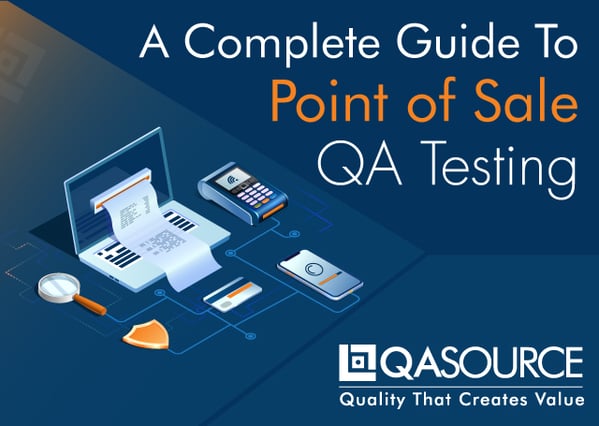
If anything is certain these days, it’s the ever-changing digital landscape of retail. From in-person stores to eCommerce, businesses must offer an omni-channel experience in order to survive in today’s economy. And every consumer touchpoint relies on technology for delivery, be it a seamless frontend user experience online or a secure backend of transaction data to process and approve.
So, why don’t more businesses invest more in their Point of Sales software system? Often because it’s hard to comprehend the consequences that follow when a system isn’t regularly tested - until it’s too late.
We’re here to change that. In this complete guide to Point of Sales QA testing, you can expect to discover:
- What is Point of Sales (POS) software?
- What is POS testing?
- Common challenges for POS users
- Common challenges for POS software testing
- Primary POS QA testing
- Benefits of POS testing
What Is Point of Sale Software?
POS or Point of Sale software is a technological solution for retail businesses, hotels and restaurants to perform retail transactions effortlessly from anywhere. This vital software often integrates with other applications and software systems including inventory, warehouse, purchase order, supply chain, merchandise planning and marketing.
Because POS systems are complex and tightly integrated with multiple systems, software testing verifies that there are no issues during the transaction process.
What Is POS Testing?
POS system testing is the process of software testing retail domains to confirm that the Point of Sales software is ready for market. In addition to executing POS test cases through a web app, QA engineers and retail software testing services are able to carry out reliable POS automation testing. These are done in reliable testing labs so that tests are executed in a real-world environment.
Common Challenges for POS Users
Without POS testing, small defects can escalate into massive issues that impact how consumers interact with your business during the transaction process. When software testing for retail is not regularly performed, your consumers are likely to experience these challenges with your POS system.
-
Payment Processing Delays
There are valid delays that online purchasers should expect with payment processing, from bank/credit card communication to fraud prevention measures. But, when payment processing takes longer than 48 hours, consumers feel frustrated and deceived, especially when paying more to rush an order that still doesn’t arrive for two weeks. Customers are likely to cancel orders and shop elsewhere because of this slow experience, decreasing earning potential for a business reliant on this cash flow.
-
Security Compromises
Customers want a safe shopping experience that doesn’t compromise their finances or personal information. A security glitch while processing their transaction has the potential to cancel out years of consumer loyalty, and because security breaches must be disclosed to the public, potential consumers are also likely to shop elsewhere.
-
A Poor User Experience
Consumers expect their user experience during a purchasing process to be as seamless. However, a complex navigation flow can quickly stop a potential buyer from making that purchase. Expect a spike in abandoned carts if your user experience is confusing, requires too many steps or constantly crashes.
-
Heavy Load Times Affecting Performance
Customers today do not want to wait. When heavy load times lead to a slowdown in speed, expect an increase in frustrations from your customers wanting to make a purchase. Because heavy load times can also weaken how well the POS system performs, consumers may drop out of the payment process should any glitch in the experience arise.
POS Software Testing Challenges
Thorough software testing for retail domains is ideal, especially for a software system as complex as POS. That being said, the Point of Sales software system presents complex challenges that must be addressed early on in the development cycle before testing the system can begin.
-
Varying Configurations
When a business has multiple operating locations, retail software testing services must consider each store’s requirements. For example, one store may be running a special promotion that is not honored at the other locations. POS test cases must examine how well the POS system can handle variance in configurations within the software system.
-
Intricate Interfaces
Because a lot needs to happen during the payment process, a Point of Sales system often showcases an intricate interface. Software testing for retail requires QA testers to develop a comprehensive test plan that encompasses all touchpoints and features within the application. While many of these test cases can be executed through POS automation testing, several types of tests still require manual execution.
-
Compliance With Payment Card Industry Data Security Standard (PCI Compliance)
Any business that accepts payments with credit cards and debit cards must be PCI compliant. POS system testing must focus on how to eliminate risk whenever a consumer’s card details are involved. Without test cases designed specifically for PCI compliance, your business is more susceptible to security breaches, bad press, lost revenue and lost loyalty. This demands QA engineers to stay up to speed on all security standards and PCI compliance requirements.
-
Continuous Upgrades and Maintenance
POS testing requires a specific setup for all devices, including all versions of the software and multiple types of hardware devices. This is both an investment in cost as well as time in crafting the right POS test cases for compatibility testing and integration testing. Some companies who do not partner with retail software testing services try to save money by consolidating testing equipment, however this limits the ability for QA teams to properly test the POS system.
Primary POS Testing Methods
Your POS testing strategy should review a variety of scenarios within the Point of Sales software application, including cashier activity, payment gateway processing, sales, promotions and discounts, returns and exchanges, security, performance and regulatory compliance. With this in mind, here are the primary tests that strategic QA teams and retail software testing services apply within their testing plan of a POS software system.
-
Compliance Testing
Also known as conformance testing, compliance testing is a type of software testing for retail domains that determines if the POS system meets all industry requirements, from external standards (such as PCI compliance) to internal standards. Regular compliance testing ensures the health of the management system so that the software is always in alignment with the regulations of the industry and the needs of the business.
-
Performance & Load Testing
Performance testing determines how well the POS software performs in terms of stability, responsiveness and sensitivity under a particular workload. QA testers also execute load testing to confirm that the Point of Sale software system can maintain speed and reliability during peak load times across multiple user instances. A successful QA team follows a strong performance testing checklist so that no step is missed during the POS automation testing process.
-
Payment Gateway Testing
This type of POS testing validates the security, performance and reliability of the payment gateway within the Point of Sale software system. In POS software, a payment gateway is an application service for approving credit card payments for online purchases. When software testing in retail domain, QA testers verifywhether the encryption and security of the payment details between consumer and merchant are maintained throughout the payment experience.
-
Security Testing
QA teams execute security testing as a way to uncover any threats, vulnerabilities or risks within the POS software so that the system can withstand any malicious attacks from intruders. A successful QA team includes vulnerability testing tools within their tech stack and follows a strong security testing checklist during POS system testing.
-
Integration Testing
This type of POS automation testing is also known as I & T (Integration and Testing), string testing and thread testing. In short, integration testing focuses on confirming that data is transferred successfully within the modules of the POS software system. QA engineers execute these POS test cases in order to expose any defects within the interaction between modules after integration.
-
Usability Testing
It’s essential for QA teams to see if the POS software is easy to use for real consumers. When applying types of usability testing, real users are asked to complete tasks within the Point of Sales software application to see which parts of the experience cause the user problems or confusion. Because QA engineers monitor these testing sessions, comprehensive recommendations can be passed along to the development team prior to market deployment.
Benefits of Testing Retail Software
POS testing provides benefits for anyone who interacts with the system, be it the retail business, consumers, QA engineers or developers. A continuous cadence of POS application testing leads to:
- A glitch-free customer experience across eCommerce channels
- Earlier identification of defects
- Faster development and deployments
- Improved business outcomes
- Enhanced user experience and stable performance across the POS software system
Need more guidance in testing your POS software system? Choose to partner with a retail software testing services provider like QASource. Our team of testing experts are skilled in the retail domain and can help you create a comprehensive testing strategy for your POS software application. Get in touch with a QASource expert today.

